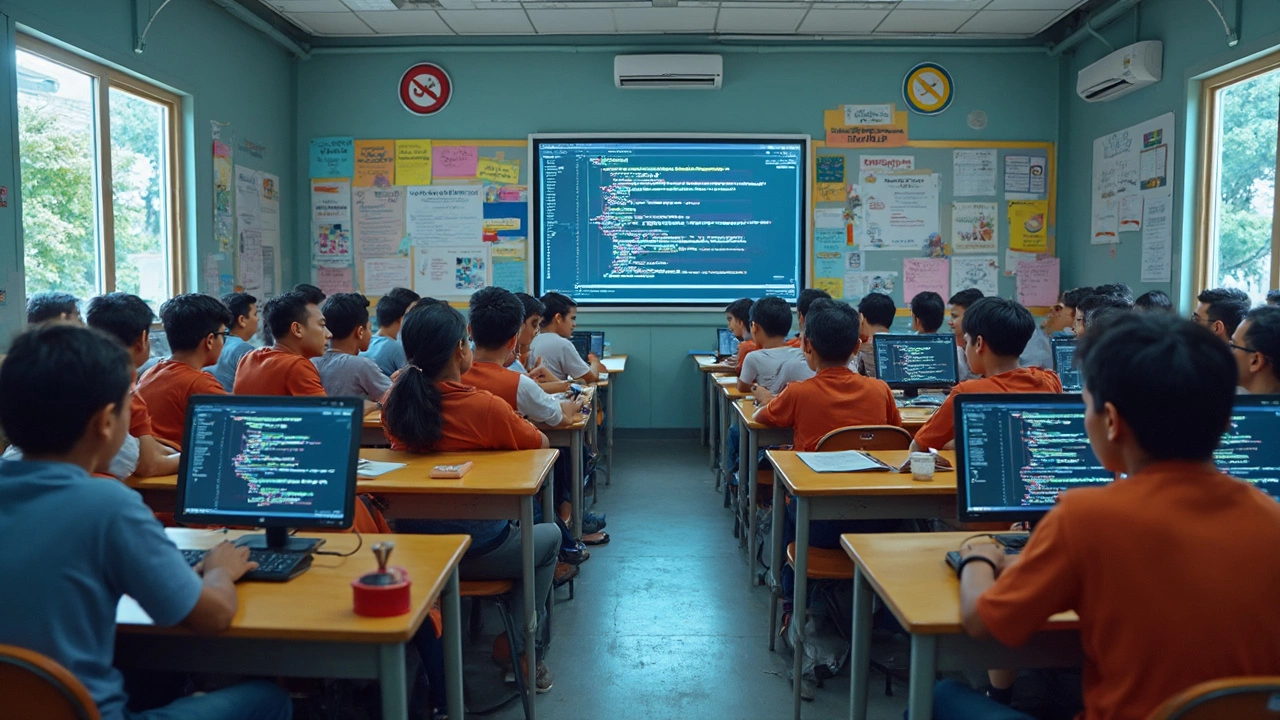Alright, let's talk about something that mixes people up all the time: coding and programming. Now, if you've been dabbling in the tech world or considering a leap into it, you've probably heard these terms thrown around like they're the same thing. Spoiler alert: they're not identical twins. Think of coding as one slice of the programming pie.
Coding is the act of translating logic into a language that a machine can understand. It's like writing a message that your smartphone, laptop, or any other gizmo knows how to read. Programming, on the other hand, is more like creating the overall mission for that message. It involves figuring out what needs to be done, planning the steps, and using coding as one of the tools to get the job done.
You might think, "Who cares? Coding or programming, it's all about computers, right?" Well, knowing the difference can actually spice up your tech journey. Whether you're a newbie or someone looking to dig deeper, understanding these nuances helps you choose the right path and tools for whatever project or course you're diving into.
- Defining Coding and Programming
- Key Differences and Misconceptions
- Real-World Applications and Examples
- Tips for Beginners: Where to Start?
Defining Coding and Programming
So, let's kick things off by getting a grip on what coding actually is. Picture this: coding is like learning a language, but instead of Spanish or French, you're picking up Python, Java, or C++. These are languages written to communicate with computers. Here, you're essentially translating human intentions into commands that machines can execute. Seems pretty cool, right?
Now, swing over to programming, which is a bit more layered. If coding is like speaking, programming is writing a novel. It's about designing the entire storyline before you even hit the 'code' key. Programmers start by identifying problems, then nail down the logic and steps needed to fix those problems.
Let's put it this way: when you're coding, you're crafting the sentences. When you're programming, you're setting up the plot and character arcs first. Programming includes tasks like debugging, testing, and deploying applications. It's a big picture process, while coding zooms in on the details.
For folks just stepping into the tech arena, it’s key to know these differences. Why? Because it helps you pick relevant courses or career paths. If you're the kind who likes planning stuff, programming might be your jam. Prefer hammering out details? Then coding could be where you shine.
Here's a quick look at how these two fit together:
- Coding: Writing in languages like Python, Java, etc., compiling, executing code.
- Programming: Planning, designing algorithms, solving problems, testing, and maintaining.
For newbies, grasping these concepts can make your learning curve a little less steep and way more fun!
Key Differences and Misconceptions
Let's clear the air on what's what when it comes to programming and coding. People often use these terms like they're interchangeable, but just like all squares are rectangles but not all rectangles are squares, coding is just one part of the programming puzzle.
Coding is pretty much about writing instructions in a programming language. Think of it as scribbling down recipes; you're writing in a way that computers get. Languages like Python, Java, or C++ play the role of English or French here.
On the flip side, programming is the big picture stuff. It involves planning and thinking through problems. You're not just writing code; you're designing, testing, debugging, and maintaining what's eventually gonna be a software program. Imagine a chef not only writing recipes but also organizing the kitchen and choosing the dishes for the menu.
“Coding is translating requirements into a form a computer can execute, whereas programming is a more holistic approach that includes coding, planning, and problem-solving,” says Dr. Sarah Duncan, a computer science professor.
One common misconception is that coding alone makes you a programmer. While knowing how to code is crucial, programming demands a broader skill set, which sometimes includes soft skills like problem-solving and critical thinking.
Another mix-up people fall for is thinking programmers just sit and write code 24/7. In reality, a big chunk of programming involves tasks like debugging, testing, or even collaborating with teams to brainstorm solutions. According to a 2024 survey by the Tech Career Institute, only 42% of a developer's time is actually spent writing and fine-tuning code.
Getting these differences straight can save you time and frustration, especially if you're taking coding classes or starting on a project. So remember, while all coders can program, not all programming involves just coding.

Real-World Applications and Examples
You might be asking yourself, "Alright, I get the difference, but why does it matter in the real world?" Well, let's dive into some everyday scenarios where coding and programming play a role. From apps on your phone to the cars on the street, these concepts are driving forces behind modern tech.
First up, let's talk about web development. If you've ever visited a slick website, there's a good chance that coding was used to create the structure and look of the site. HTML for the layout, CSS for styling, and JavaScript for those snazzy interactive elements you click and swipe. That's coding in action!
On the flip side, when a developer builds an e-commerce platform, they're programming it to handle things like inventory management, user accounts, and payment processing. It’s like constructing a whole ecosystem where things need to work seamlessly. The programming involves design patterns, logic flow, and algorithms that determine how things operate behind the scenes.
Take software development, another realm where programming is key. Think about the operating systems on your computers and smartphones. These systems aren't just a fluke—they're crafted with intricate programming to manage everything from your apps to hardware interfaces.
Ever wondered how your car knows when you're drifting into another lane? It's a neat piece of tech called lane-keeping assist. Behind it, there's a blend of coding and larger programming systems. The sensors use coding to interpret data, while the broader system is programmed to respond in a split-second to keep you safe.
Want some numbers? According to a recent survey on programming trends, about 44% of developers work with web technologies, while 48% focus more on mobile. This goes to show how widespread and varied these applications are in our lives.
Whether it's the next great app or the software running a smartwatch, understanding the role of programming and coding can seriously shape your tech skills. It's not just about entering lines of code but envisioning outcomes and building solutions.
Tips for Beginners: Where to Start?
Jumping into the world of programming and coding can feel a bit like stepping into a swirling tech storm, but trust me, it's a rewarding ride. So, where should a newbie start on this journey? Let's break it down!
First things first, pick a programming language to learn. You can't go wrong with starting with Python. It's beginner-friendly, has a simple syntax, and is used in everything from web development to data science. If you're interested in web stuff, maybe give JavaScript a whirl.
Once you've chosen a language, get your hands on some resources. Books are great, but online platforms like Codecademy, freeCodeCamp, and Coursera offer interactive tutorials and might suit you better if you learn by doing. Check out YouTube too; tons of creators out there break down concepts in easy-to-follow videos.
Next up, practice, practice, practice. Don't just read about coding; write code! Start with small projects like a calculator app or a basic website. It doesn’t have to be perfect. The idea is to get your hands dirty.
Feeling stuck? Join a community. Websites like Stack Overflow have plenty of folks eager to help. Or attend local coding meetups if you prefer face-to-face interaction. Surrounding yourself with like-minded learners can boost your skills and motivation.
Finally, don't stress about making mistakes. Everyone does! It's like a rite of passage in the tech world. Learn from them and keep pushing forward. And who knows? Maybe one day you'll be sharing your own tips with the next batch of aspiring developers.

